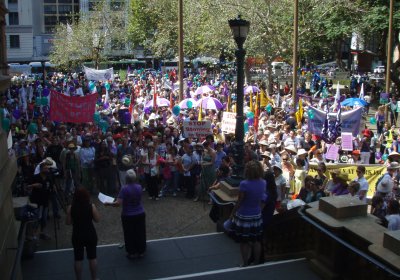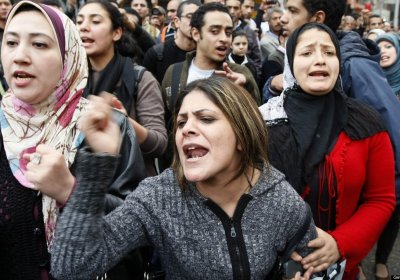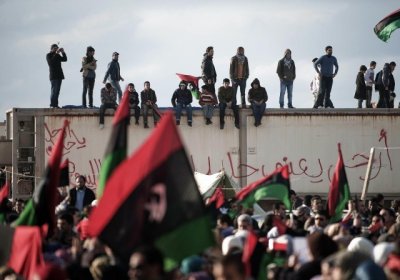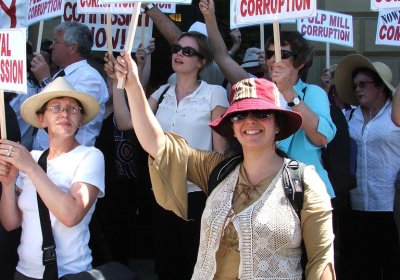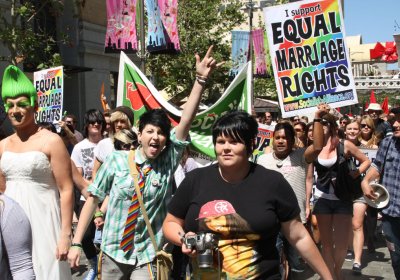The pro-democracy protests in Bahrain and Saudi Arabia have the potential to have a huge impact on world politics. The stakes are very high.
In Bahrain, Saudi Arabia’s tiny island neighbour, protesters have mobilised in their hundreds of thousands for weeks to demand the Khalifah royal family be removed from power.
Bahrain is of great strategic importance for the West. It hosts the US Navy's fifth fleet and a US airbase. This helps ensure US control of the oil-rich Persian Gulf region and the ability to maintain a constant threat against Iran.
872
About 2000 people attended the March 12 International Women’s Day rally in Sydney. The rally demanded equal pay for women workers — specifically better pay for community sector workers.
Tunisian Prime Minister Beji Caid Essebsi announced on March 7 the dissolution of the country’s secret police arm, the British Guardian said that day.
This step toward democracy is the most important taken by any Arab country for decades.
Tunisia’s interim government also abolished the Ministry of Information, which had been in charge of censorship, allowing a free press to flourish, GlobalPost.com said on March 7.
The March 8 demonstrations commemorating 100 years of International Women’s Day in Cairo, Egypt — flowing on from the inspirational revolution that toppled dictator Hosni Mubarak on February 11 — have highlighted the ongoing struggle for women’s rights around the world.
One hundred years ago, more than one million people in four European countries attended the first IWD protest. It was organised in support of the right to vote and equal pay for women.
Saif al-Islam, the billionaire son of Muammar Gaddafi who was the neoliberal darling of Western governments until only recently, boasted in a March 10 interview with Reuters that forces loyal to his family were now on the offensive against rebel forces.
NATO, for its part, has decided against military intervention — for the time being.
However, France became the first government to recognise the rebel Interim Transitional National Council (ITNC) set up in Benghazi on March 5. AFP reported that French President Nicolas Sarkozy has also proposed “targeted air strikes” on Libya.
The government in Yemen is becoming more desperate amid continuing protests across the country calling for the removal of President Ali Abdullah Saleh.
Tensions came to a head when security forces fired on protesters at a university in the capital Sana'a, killing one person and wounding many others, AlJazeera.net said on March 9.
Security forces also gassed the crowd with what is alleged to be nerve gas, SMH.com said on March 10.
Despite the attack, thousands of protesters defied police and continued occupying the university square, AlJazeera.net said.
The six-year campaign against Gunns’ proposed Tamar Valley pulp mill in northern Tasmania is entering a critical stage.
Federal environment minister Tony Burke approved the three outstanding modules of the mill’s environmental management plan on March 10.
However, pulp mill opponents remain staunchly against the project in whatever form and have vowed to organise ongoing protests and blockades to stop it going ahead.
A mass protest has been called on the site for March 20.
About 10,000 people marched on the Philippines Congress on March 8 to mark International Women’s Day (IWD) and demand passage of the Reproductive Health Bill before Congress.
The bill would allow greater access to modern contraceptives and sex education.
The bill proposes more maternal health services, raising the number of midwives to one for every 150 deliveries. Contraceptives would also be funded for poor women and would be included in the standard supplies of medicine in hospitals.
Modern family planning methods would be provided in all accredited health facilities.
Since 2004, a mass mobilisation of popular support for marriage equality for lesbian, gay, bisexual, transgender, intersex and queer (LGBTIQ) people has gained momentum, and now a possible victory is in sight.
But sadly, marriage equality would not mean an end to homophobia or transphobia in Australia.
Lurking behind Australia’s marriage ban is an even more sinister injustice clothed in the language of religious tolerance.
In a July 2010 interview with WikiLeaks editor-in-chief Julian Assange, TED.com’s Chris Anderson said WikiLeaks had released in just a few years more classified state and military documents than every other media outlet combined.
“It’s a worry isn’t it,” Assange said. “That the rest of the world’s media is doing such a bad job that a little group of activists is able to reveal more of that sort of information than the rest of the world’s media.”
Federal immigration minister Chris Bowen announced plans for a new 1500-bed detention facility on March 3. It is to be located at Wickham Point, an industrial area 35 kilometres south-east of Darwin.
The March 4 NT News said the Darwin Airport Lodge, which currently houses refugees, would also be expanded by 400 beds.
This would bring Darwin’s total detention capacity to 2900, making the city the largest detention location on the mainland — larger even than the notoriously overcrowded Christmas Island facility.
Two activists were arrested on February 20 at a demonstration outside the US Embassy in Tokyo. The activists were taking part in a demonstration against the construction of a United States military base in Okinawa.
The activists were released from custody on March 5. Their supporters are campaigning for the charges against them to be completely dropped.
The demonstrators had received police permission to rally. But on reaching the embassy, protesters were greeted by a wall of police.
- Previous page
- Page 4

